Whether you’ve been to Europe before or not, sometimes you might find yourself with plenty of time but not plenty of money. If you’ve got at least two weeks and hopefully closer to four weeks, you can still have an amazing experience in some of Europe’s greatest cities on a small budget. If you’ve visited London, Paris, or Rome before, you’ll be happy to know that you can visit many other cities while spending half or even less per day.
The itinerary suggestions below are perfect for two quick weeks. If you have more time this is still a great itinerary to use as a starting place, and you’ll find other places you’ll want to add along the way if you have more time. We use our Europe Backpacker Index to show the price comparisons of the cities suggested. Each of those prices is a typical day’s expenses for someone on a ‘backpacker’ budget. If you prefer 3-star hotels you’ll spend at least a bit more per day, but if you are sharing a cheaper hotel room it can still be shockingly inexpensive. By the way, for your first trip to Europe you probably want to choose England, France, or Italy, and save the cheap ones for your next trip.
Note: This article was last updated in August, 2022.
Best four cheap European cities to visit together
- Berlin, Germany
- Prague, Czech Republic
- Budapest, Hungary
- Krakow, Poland
Each of the cities listed above is strong enough to be the highlight of almost any trip, and fortunately they are relatively close together so they work really well as a group. On the map they sort of form a box, so skipping one is easy, and there are plenty of side stops and trips possible in between for shorter or longer stays.
A version of this itinerary can also be found on my new best Europe itineraries for first-time visitors article.
Best cheap and gorgeous small town to add to your trip
- Český Krumlov, Czech Republic
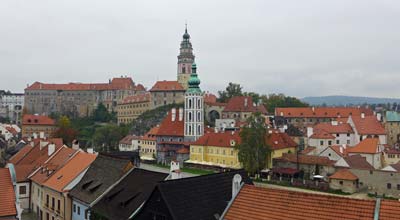
Getting there and back
While none of these cities is among the cheapest in Europe to fly into, at least 3 of them have cheap enough flights that it’s worth flying directly into one of them.
Of the four cities, Berlin will have the cheapest inbound flights from almost anywhere, and Krakow usually only has cheap flights from within Europe. Check flights from your city into each of these cities to see which one will be your cheapest option.
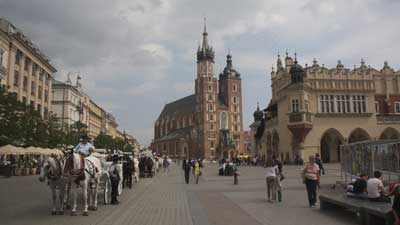
Getting between the cities
There’s little doubt that the most enjoyable way to get between these cities (and most European cities) is by train, but you do have two other main options to consider, namely, flights and buses.
Trains
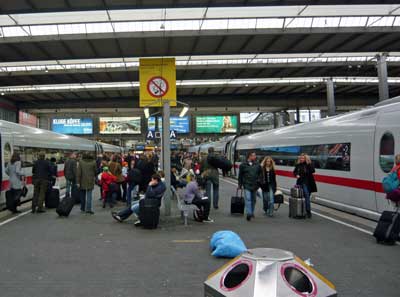
Flights
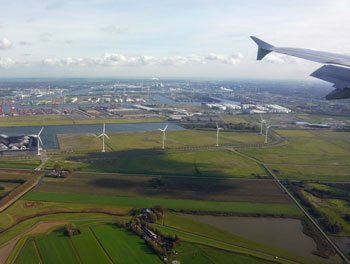
Buses
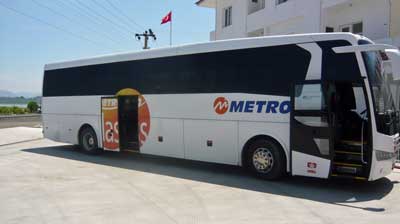
4 Best cheap European cities that are easy to travel between
Below you’ll find the four best cities to use as the foundation of a cheap and wonderful trip to Europe. It’s recommended to spend at least 3 nights in each city, even if you think you are in a hurry.
Berlin, Germany
2022 Backpacker Index: US$64.56/day
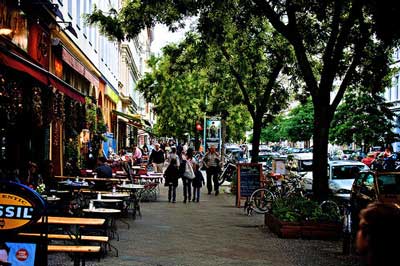
One challenge is that Berlin is a huge and spread-out city, so it’s important to choose where you stay wisely. Most budget travelers will prefer the former East Berlin section around Mitte and Prenzlauer Berg, which is where most hostels are as well as the best and cheapest nightlife and shopping. Check our list of recommended cheap Berlin hotels for a place to start.
What to see and do in Berlin
Start with the Berlin Free Walking Tour on your first morning, and you’ll have enough ideas for what to do for the rest of your stay from that alone. Being honest, the Reichstag (capital building) is a bit disappointing from the inside, although the city does have a handful of great museums clustered together that appeal to many. The Berliner Dom (cathedral) is well worth a visit and you’ll get some great photos from out front.
But mainly Berlin is about exploring the weird and funky neighborhoods for food, shopping, and nightlife. Fortunately, most of it is quite cheap as well. Probably the most famous food to try is currywurst, which is usually a paper tray containing a sliced up hot dog coated in a curry-flavored ketchup. I’m not really a fan, but you should try it, especially after a few beers.
Prague, Czechia
2022 Backpacker Index: US$53.95/day
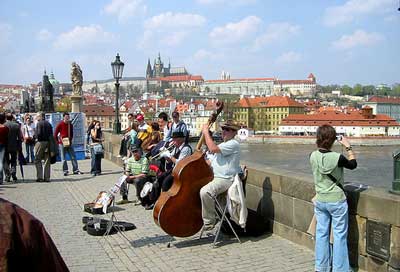
Prague is also fairly compact, with most things walking distance from each other. The city is also quite cheap still, at least compared to Western Europe, although hotel prices can seem high if you want to stay in the middle. Check our list of recommended cheap Prague hotels for some really good ones only a quick and cheap tram ride away.
What to see and do in Prague
Aside from the famous clock in the town square, Prague has a few other very worthwhile checklist attractions. The Prague Castle is one of the largest and most incredible in Europe, and the Charles Bridge and its statues feels like you should have to pay to cross it. As with most European cities, it’s wise to start with a “free” (tips-based) walking tour on your first morning in town. The Prague ones are excellent and in a couple hours you will have seen most of the famous landmarks while hearing the interesting stories behind them. Even a US$10 equivalent tip per person is a great bargain, but tip whatever you feel good about.
There is plenty more to fill a few days, plus you can catch a cheap classical concert in one of the many venues offering them, or just indulge in cheap and excellent beer like everyone else.
Budapest, Hungary
2022 Backpacker Index: US$30.45/day
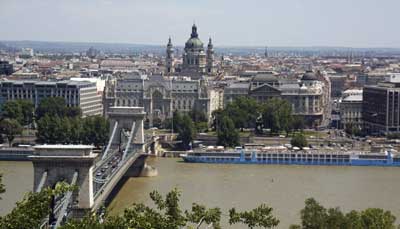
Budapest is also compact enough that budget travelers can stay in the cheap hotels and hostels a bit inland on the Pest side, and still walk everywhere while sightseeing. The Free Budapest Walking Tour covers highlights on both sides, and is a great introduction.
What to see and do in Budapest
During daylight hours, Budapest has the standard selection of monuments and museums in addition to its castle complex, but separates itself from other big cities with its abundant hot springs and spas. Tourists can easily mix with locals and take a dip at a modest fee in one of the unique facilities spread around town.
At night, however, Budapest really comes into its own, with some of the most interesting nightlife in Europe. Head for what are known as “ruin pubs” on the Pest side in the old Jewish Quarter to quaff cheap drinks in converted courtyards that each has its own weird vibe.
Krakow, Poland
2022 Backpacker Index: US$30.72/day
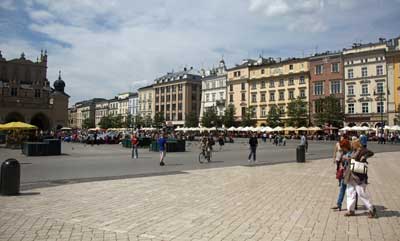
For those who like hearty portions of meats and sausages, Krakow is wonderful, but there are also many Italian and other international cuisines, including many vegetarian options, so something for everyone. Hotels just on or near the central square are reasonable, but you can stay for a lot less by going a few blocks away.
What to see and do in Krakow
As in many other cities, taking the Krakow Free Walking Tour is a great way to get oriented on your first day so you’ll know what you want to explore more deeply. You can also cover many of the main central sights on that tour, which leaves time for day trips and hanging out. Sad though it may be, a half-day trip to nearby Auschwitz is something you’ll never forget, and there is a fun salt mine attraction not far away as well.
In the evening you’ll probably find out why Krakow is very popular with the weekend party and stag-do crowds. You can sip affordable wine at one of the cafes on the square, but it might be more fun to do a pub crawl through the varied drinking establishments in the nearby Jewish Quarter. It’s easy to find a .5L beer for around US$1.50, so getting carried away is common.
Český Krumlov, Czech Republic
2022 Backpacker Index: US$40.47/day
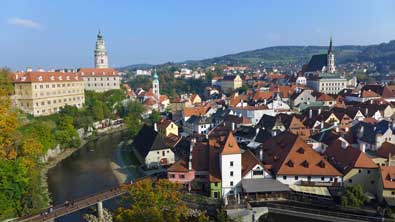
There are almost no chain hotels or restaurants of any kind, so staying here will be a very local experience. Better still, hotels and food here are much cheaper than even in Prague, so the value is outstanding. The historic town center is small enough to walk through in less than 10 minutes, yet you can still get nice hotels in its heart starting at around US$50 per night. As of 2022 the hostels in Český Krumlov are closed so we had to use hotels for the Backpackers Index, which makes the index price artificially higher than it should be. In other words, if you visit this town you’ll find it to be pleasantly affordable.
What to see and do in Český Krumlov
Český Krumlov does have an impressive castle perched above the compact town center, and you’ll definitely want to tour at least part of it. But really the main reason to visit the town is to slow down and appreciate being outside of Europe’s large cities for 2 or 3 days. Those other four cities are always busy and crowded, while this one is gentle and lovely, although you will be surrounded by quite a few other tourists.
As with the other cities on the list, there is a highly recommended free walking tour in Český Krumlov, which is a great place to start. That tour will also show you and explain all of the other worthwhile nearby sights, but I won’t blame you if you just prefer to grab a seat at one of the cheap restaurants with outdoor seating on the main square, and relax over a few delicious and inexpensive beers for a while.
Additional photo credits: Berlin by Philippe AMIOT on Flickr, Prague by POldi♬24 on Flickr

Hi Roger,
Your replies to others are so helpful! I’m hoping you have some advice for me. My boyfriend and I are looking to do a trip to Europe in January 2017. We’re from New Zealand, and were planning to fly into London to visit family – but to spend 2-3 weeks in Europe too before either venturing to Spain or returning to the UK before departing back to NZ. We know it’s the coldest time of the year but thought we might do some skiing. Our budget is about 3000 Euro each for the entire trip (including London expenses but not flights from NZ to UK). While in London we can probably stay with family so accommodation costs are reduced. Can you suggest a possible itinerary for the trip? I’ve previously been to Paris, Nimes, Nice, Cinque Terre, Pisa, Florence and Rome on a very whirlwind trip. I don’t mind returning to any of these places although I am interested to see other parts of Europe. Any thoughts would be much appreciated!
Rebecca,
As long as you focus more on cities and mountain resorts as opposed to beaches (obviously) and other outdoor-oriented places, then Europe in the winter is very nice. The tourist crowds are gone, hotels are at their lowest rates of the year, and the cities are still bustling with life because all of the residents are still there.
If you want to do some skiing you might have a look at this article I put together a few years ago about Europe’s cheapest ski areas.
It’s hard to confidently suggest anything without knowing more about where you might want to go. Your budget seems like it should be fine for almost any area in Europe that time of year, although in some places you might have to cut more corners than in others. It looks like you’ve hit the main highlights in Italy and France, and later you might head to Spain, so that already takes care of most of southern Europe. Obviously there are many other places you could stop in Italy or France, but aside from Venice, most of those tend to be a bit deserted that time of year, unlike the larger cities.
If you don’t mind packing winter clothes, then you should seriously consider the cities on the article above, namely Berlin, Krakow, Prague, and Budapest. They are all large cities with good public transport, and they will be full of (indoor) life in January.
If you’d prefer places that are at least a bit warmer then you might tour Portugal before Spain, particularly in Lisbon and Porto. Or you could go to Croatia with some time in Split and Dubrovnik. Those are more warm-weather places, though Split is a proper city so everything will be open there.
Let me know what you think about any of these suggestions, and I’ll be happy to add more details if you like. -Roger
Hi, I am a single mother and I want to travel with 2 kids 5 and 9. Not sure but I don’t want to wait and I can’t go solo. Should I be looking at a different itinerary or take a chance with yours?
Awesome work and thanks to people like you who keep inspiring people like us! Thanks
Ash,
The four cities listed are all interesting and tourist-friendly cities, and they are all quite affordable compared to, say, London, Paris, or Rome. So if you visited these four cities I’m sure you and the kids would enjoy them. But I hope you really consider each of them and then go only to the places that really interest you. This itinerary is just a suggestion for great cities that are fairly cheap and fairly close together, but there are many other options.
Especially when traveling with young ones, I highly recommend at least 3 nights in each city you visit. Going between cities takes some effort and will likely be a bit of a hassle with kids in tow, so I recommend trying not to move too quickly. If you have any other questions on this I’ll be happy to answer them. -Roger
Hey Roger,
Many thanks for helping fellow travelers with their backpacking schedules.. Me and a couple of friends are planning a 20-day backpacking trip to Europe. We are budget travelers and will be looking at bunking in hostels. Some places we would like to cover – London, Amsterdam, Prague, Paris, Italy – Rome, Venice, Switzerland, etc. We would want to spend considerable time in each of these places depending on the area that needs to be covered and to blend in and experience the culture of each of these. It would also help if you could suggest country sides that we can visit as we go along. Also, how expensive or viable is it to hire a car to drive through some of these places as we are 4 of us traveling and the costs may be divided .. compared to train journeys. If you could help us with routing to the mentioned cities and what mode of transport to take.. it would help a great deal for us. Thanks again for all the help you have and you will be doing to all travelers. Cheers!
Karthik,
I’ll be happy to try to help, but I think this is going to be at least a 2-step process. I’ll give you some things to think about, and you’ll have to sort out your preferences before I can really make concrete suggestions.
First off, my general recommendation is to plan on 3 nights in almost any city you visit, or even 4 nights in large and top-tier cities like London and Paris. Smaller cities like Venice can be done in one or two nights, but most cities you want to spend 3 nights in because if you go faster than that you’ll end up spending too much of your trip on trains and in train stations.
As for renting a car and driving, I normally don’t recommend it for visiting cities in Europe. It can be the best way to tour wine regions and small towns and even some coastal areas, but for going from one city to another, a car is an expensive burden because parking is very costly and hard to find unless you stay on the edge of town. So I highly recommend taking trains, or perhaps a few buses.
If you only have 20 days I’d shoot for 6 or 7 total cities. You can’t do better than London (3 or 4 days), Paris (3 or 4 days), and Amsterdam (3 days). If you did them in that order then you next best stop is to Berlin (3 days) and then to Prague (3 days). If you did that, you’d only have about 5 days left, which isn’t really enough time to do Italy.
Also, you’d want to take a minimum of 3 or 4 days in Switzerland (Interlaken and Lucerne), and as gorgeous as it is, it’s extremely expensive so it may be better for a future trip.
From London to Paris you’ll want to take the Eurostar train, and then normal trains until Prague. From there you might take buses, depending on where you want to go next.
If you want to include Italy, which of course is one of Europe’s highlights, the fastest trip that I could recommend is 1 night in Venice, 2 nights in Florence, and 3 nights in Rome. Even that is too fast for many people. It might be better to save Italy for a future trip, or you’d want to cut out some of the other possible stops.
So consider what I’ve written and let me know which cities you really want to include on this trip for sure. After that I’ll be happy to provide more details and suggestions. -Roger
Roger,
infinite thanks, your posts have helped me a lot.
However, any extra suggestion into planning our itinerary as well as transportation and accommodation options is highly appreciated.
A friend and I are planning to visit Europe in the summer for 3-4 weeks, we will kick off on July 15th,
I’ll start off with countries that we have interest in.
we intend to start off with Spain because it’s very close to Morocco (our departure point) and also because we plan to spend a few days with a relative of mine who lives near Alicante, a coastal city in east/south Spain, France makes second on our list of interest and then come other countries. we are open to any input and also consider our budget would be something around $2000-$2500 each including air fares.
Thank you again
Ismail,
I’ll be happy to try to help, though I’m a bit unsure of what you are asking. Interestingly, I’m in Spain myself at the moment, in the Malaga area. The high speed trains here in Spain are quite expensive unless you buy way in advance, but they have a good bus network here that is still pretty cheap. In other words, check train fares but plan on probably doing buses until you get to France.
Southern France in late July or early August will be incredibly crowded and expensive. If you budget is limited, I’d probably skip it on this trip because it would also cost a lot to take trains into Italy or Switzerland. Your best budget bet would be to fly from Barcelona to Budapest or Prague, and then carry on in that area. Your budget will go twice or three times as far in Hungary, Czechia, and Poland, as it would in Italy, Germany, or Austria. Berlin can be a decent bargain and it’s interesting.
I hope this helps and I’m happy to be more specific if you have specific questions. -Roger
Thanks again Roger for your valuable tips.
Regarding France, what we have interest in is the north part of France actually, we have a network of friends who live there and we plan to pay most of them a visit and hang out. with that being said, do you think northern France would cost much as well ?
As of transportation, from what you said, I understand that to travel within Spain, buses are my best choice. do you have any names in mind? Do I need to book tickets now?
What is my best transportation option(s) when Traveling inter-countries. ?
Ismail,
In the peak of summer, northern France won’t be too crowded and in fact it will be partly empty because so many have gone south. And if you have places to stay for free, it will be very reasonable. The main thing to avoid is staying in the beach resorts in summer, where you have to compete with millions of Europeans who are there for a whole month.
There are many different bus companies in Spain, and they all offer similar service from what I’ve seen and read. I don’t believe there are many competing companies on specific routes, so if you want to go from, say, Seville to Madrid, you’ll probably have one company doing it. Buses tend to have the same prices no matter when you buy, but some of these companies have started with “dynamic pricing” where prices go up as more seats are sold. You should just google a route that you might do, like “Seville to Madrid bus” and you’ll see results from a few new bus fare aggregator sites. Once you find one of those sites, busbud.com is one of them, you’ll be able to check fares on all routes and see if they are cheaper if you buy longer in advance.
For bus travel between countries there is a company and website called Eurolines.com. They run a network of buses that go between all major cities in Europe, and fares on those do tend to be cheaper if you buy them in advance. I’m sure it’ll all make sense when you start researching the specific legs you are planning. Best of luck. -Roger
Hi, we would be there for 16 nights.. Out of these which is a better itinerary –
1. Vienna to Budapest to Berlin to Prague to Cesky Krumlov to Salzburg to Vienna
2. Vienna to Budapest to Berlin to Prague to Cesky Krumlov to Wachau Valley to Vienna
3. Vienna to Krakow to Budapest to Berlin to Prague to Cesky Krumlov to Vienna
Samidha,
I just answered this question for someone named Robin in the other thread on Europe Itinerary questions, so please have a look there and let me know if you have more questions. -Roger
Hi Roger,
I am planning a two week trip with my husband. We plan to cover Berlin, Prague, Budapest and Vienna. What smaller towns would you recommend along with these? We are flying in and out of Vienna, so what would be best itinerary to follow? We are a young couple and would want the trip to be a mix of sight seeing, nightlife and we love walking around the cities (we fell in love with Amsterdam and Florence last year.)
Samidha,
If you have 14 nights to spend in Europe, I’d recommend no more than 5 total cities, partly because each transit day is not really a sightseeing day. In other words, when going from, say, Berlin to Prague, the train trip is 4.5 hours, but if you count from the time you check out of one hotel until you get to your hotel in the next city, it’s more like 7 hours. And those 7 hours will be in the middle of the day, so if you check out at 9am then you’ll check into your next room at 4pm. After that, you’ll be a bit tired and maybe you’ll have enough time and energy to see one sight before dinner.
So my general recommendation is to spend 3 nights in most cities, and 4 nights in the largest ones, or maybe 2 nights in smaller cities. None of the cities on your list are especially close together, so they will all take most of a day to get between them. To answer your first question, the best smaller town to visit that is along your route is Cesky Krumlov in the Czech Republic. It’s gorgeous, quite inexpensive, and compact enough that you can see it in two nights.
If you don’t really want to do Cesky Krumlov, or you really want to move quickly and add another city, the I’ll recommend Salzburg, Austria. Actually, depending on how locked into visiting Budapest you are, you might replace it with Salzburg, which would make your route more efficient.
Flying in and out of Vienna makes this tricky because it’s one of the middle cities on your list, at least as long as you also want to visit Budapest. Either way, I think your best bet will be to land in Vienna and immediately fly to Berlin to spend 3 nights. Then take a train to Prague for 3 nights. Those two are your best nightlife cities, by the way.
After Prague you can take a bus to Cesky Krumlov (or a train, but the bus is actually a bit faster) for two nights. Then you could take a bus or train to Salzburg or Budapest or Vienna, depending on how you want to do it. From Cesky Krumlov to Budapest would be a long trip, but at least it would make the final leg from Budapest to Vienna faster and easier. I’d recommend 3 nights in Budapest and/or 2 or 3 nights in Vienna or 2 nights in Salzburg. Again, it all depends on what you prefer from the suggestions above.
All of the above might seem confusing. If you write back below with your preferences among what I’ve discussed, I’ll be happy to try to map it out even more precisely. I’m sure it’ll be an excellent trip, as all of the cities on your list (and the extra ones I’ve mentioned) are top tier destinations. -Roger
Hi,
Thanks for the quick response. Out of Cesky Krumlov, Salzburg and Krakow if I have two choose two cities which ones would you recommend. I understand doing Cesky Krumlov & Salzburg would be convenient, but i want to choose cities which are not similar in terms of their feel and life. You said I can miss Budapest.. is it not a good city compared to Cesky Krumlov, Salzburg.
Samidha,
Budapest is definitely one of Europe’s great cities and I recommend going there in general. In your case, Budapest is somewhat out of the way, so it might require a 7-hour train trip rather than a 3-hour trip to reach Cesky Krumlov or Salzburg. Also, Budapest actually has a lot in common with Prague in its size and even quite a bit of its architecture. The layout of the cities are also similar, to the point that there are stories of people using a basic tourist map of one while in the other, and not realizing it for some time. So it’s worthwhile, and the main issue is whether it’s worth it to go out of your way on this trip to see it.
As for the other two, Cesky Krumlov is tiny, gorgeous, and its tourist scene is only about 10 years old so it still feels a bit “undiscovered.” Salzburg has a beautiful location at the foot of the Alps, with a very nice Old Town center. The two main draws in Salzburg are that it’s Mozart’s birthplace (several attractions dedicated to that) and that it’s the location for the movie The Sound of Music. There are bus tours that visit many of the key filming locations, and even if you’ve never seen the movie, the bus tour is really fun and offers excellent scenery.
Also, for what it’s worth, Cesky Krumlov is the cheapest of the three cities, and amazing value. Budapest is a bit more expensive, and Salzburg is the priciest of the three. As always, let me know if you have other questions. -Roger
Hi, Your tips are very helpful! I’m Looking at planning a 3 week trip with my partner starting mid September, using your itinerary as a guide do you know roughly how much we should budget for the trip?
Clare,
Most of this site is actually dedicated to answering that question. It obviously depends on where you’ll be going and how much traveling you’ll be doing along the way. If you are a backpacker or low-budget traveler then consult our Europe Backpacker Index, which shows a daily budget that should be easy to keep with.
If you are more of a 3-star traveler then you’ll get a better idea by looking at our Europe 3-star Traveler Index.
If you are concentrating on the cheaper cities then you’ll be taking cheap trains and buses between them, so it doesn’t add up to much. But if you are traveling through France, Germany, or Spain, the transportation can add up. Let me know if you have other questions. -Roger
Thanks for the links Rodger,
At the moment looking at air bnb, havnt had much experience with hostels but are open to anything that will be cost effective. Would a eurail pass be cost effective if only travelling for 3 weeks? We are looking at starting in Berlin, krakow, budapest and then to Barcelona. Also considering Bruges. We will be flying in and out of london. Not sure if we are best to use trains, buses or by air or a mixture? Any advice appreciated. Will be our first time travelling in this part of the world
Clare,
For the itinerary you have in mind, a Eurail Pass probably wouldn’t be good value, although it could be close. The main appeal of a Eurail Pass is that it allows you to make your plans as you go and not worry about very high last-minute train fares. In other words, if you can decide on your itinerary in advance and buy those train (and bus) tickets at least a month out, it should be cheaper than a rail pass.
I’m not sure what you mean when you say that you are looking at starting in Berlin, and flying in and out of London. Does this mean you are starting in London and want to fly to Berlin to begin the trip? Or will you be flying into London and THEN want to head out for the rest of the trip? I’ll be happy to help you put a great route together once I’m sure where you want to go.
But to begin, from Berlin to Krakow to Budapest would be best by train or even bus, and those should be fairly cheap even if you buy at the last minute. Barcelona is a LONG way from all of those, so a flight will be much cheaper and obviously faster. Bruges can be reached by train from London on the Eurostar and changing trains in Brussels.
If you’ve never been to any of those places then I’d highly recommend going to Amsterdam instead of Bruges. Amsterdam and Bruges have similar gorgeous architecture, but Amsterdam has many world-class sights like the Van Gogh Museum and Anne Frank House, while Bruges is mostly just a pleasant town with few checklist attractions.
And again, I’m happy to help more with this once we clarify a few things. -Roger
I am planning a trip starting from Prague – Vienna – Bratislava – Budapest – Venice for 16 days from 13th May. Can you please suggest travel iteniary and will we need a tour operator or is it easy to travel through all these cities on our own. Will a budget of 2200 euros be enough for per person? we will be 2 adults plus 1 child travelling with us? Also can i pre-book euro-rail pass online? Will train or flights be cheaper to take? Or a drive between these cities?
Deepa,
This looks like a really good trip, although I honestly think you’ll have time to add another city or two. Venice is quite compact so you can see the main sights in a day or two, and it’s so crowded that you won’t want to stay any longer. Honestly, I would plan no more than two nights there.
Bratislava is nice enough, but it wouldn’t make a list of the 50 most interesting cities in Europe. It’s close enough to Vienna to get there by taxi, but unless you have something specific you want to see there I’d recommend choosing another destination instead such as Salzburg.
You’ll definitely want to get around by train, and a rail pass wouldn’t be good value on an itinerary like this. Some of these journeys will be fairly cheap if you buy them online in advance (from the official rail websites for each country) so you’ll save money that way. Driving would mean tolls and endless parking hassles, so I wouldn’t recommend it at all.
My recommendation is to spend 3 nights in each city, except for very large ones like Paris or London (4 nights) or small ones like Venice (1 or 2 nights). So you really could add some cities and still be able to enjoy a leisurely pace. Part of it is that you can see all of the main sights in most cities in 2 or 3 days, so Day 4 is spent going to second-tier sights or just walking around because you’ve seen the top places.
I’ll be happy to help you figure this out more, and I think your budget will be enough. If you are sure that these 4 cities are the only ones you want to see then I’ll help with an itinerary, but honestly I’d recommend adding Salzburg and maybe Berlin or Krakow or even a visit to Split, Croatia. Keep in touch and I’ll help more if you like. -Roger
Hi Roger,
Me and 2 of my other friends are planning a backpacking tour across countries in Europe. It is going to be a 12 day trip starting June. The budget is about 900$ per head exclusive of the air tickets to and fro from India. Can you please let me know the best corridor to cover? we are essentially looking at good nightlife, a bit of heritage, country side and a few big cities. If you can give me an outline for the 12 day trip as to places i can cover, itl be of great help!
Thanks in advance 🙂
Mithilesh,
For a 12-day trip I’d recommend 4 or maybe 5 total cities. Since it looks like you want to do good nightlife cities that are on the affordable side, I’ll highly recommend starting in Berlin for at least 3 days. Then take a train to Prague for 3 days. After Prague you might consider taking a 3-hour bus ride down to the wonderful town of Cesky Krumlov for 2 days or so. You could instead go to Vienna, but it’s a bit expensive and stuffy (not much of a party town). Lastly I’d go to Budapest for 3 days or so. That route, which includes a bit of countryside around Cesky Krumlov, should be perfect for what you have in mind. Take a train from Berlin to Prague and then buses the rest of the way for the best price and easiest service.
Hopefully this helps. Let me know if you have other questions. -Roger
Hi Roger. Nice to see you helping the fellow travelers out there. Even I have few questions to you.
So, I am planning a 24 days backpacking trip to Europe along with my male cousin. We would be travelling outside India for the first time.
Our Budget: ~1000 Euros per person
Time frame: 24 days
Countries: Netherlands, France, Belgium and Italy, if possible.
We don’t want to rush from place A to B. Rather we would love to feel the city/country, understand the culture and just soak in.
Please suggest an itinerary and/or any tips that you may have. Thanks a lot for reading through and helping others and me. Best Regards.
Shalini,
Assuming that you aren’t including your inbound and outbound flights in the US$1,000 per person, that’s still only about US$40 per day, which isn’t much in those areas. For example, in Amsterdam, Paris, or Rome, a bunk in a hostel in a decent location will cost around US$30/night, or maybe a bit less. If you also have to pay for your transportation during the 24 days, that makes it even tougher.
In cities like Prague, Budapest, and Krakow you can have a decent time on US$40/day per person. So I’ll be happy to help with specifics, but I think first you’ll need to figure out if you want to shorten your stay a bit, or raise your budget a bit, or focus more on budget-friendly destinations in Europe. Let me know which of those you can do and I’ll be happy to help with it. Sorry for the disappointing news but the only way to see those places for 24 days would be to get involved in the couchsurfing community and I don’t know too much about that these days. -Roger